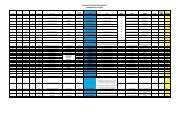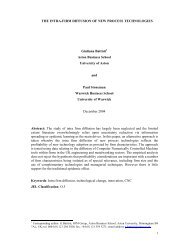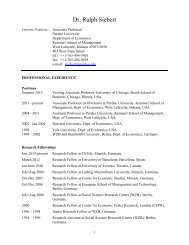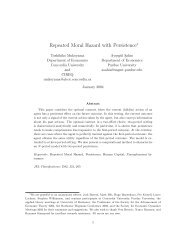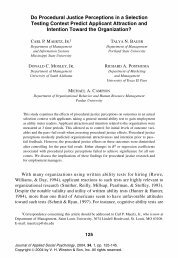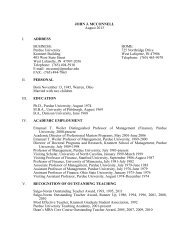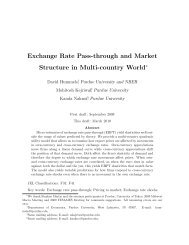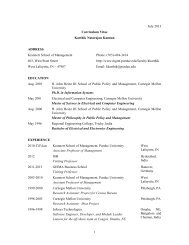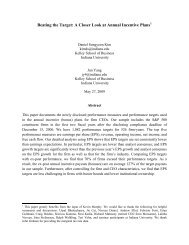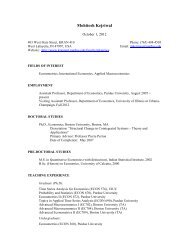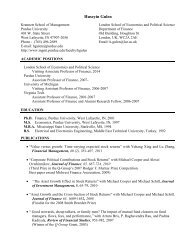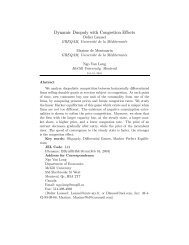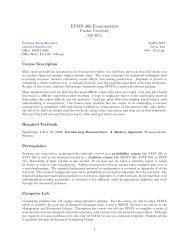October 2012 - Krannert School of Management - Purdue University
October 2012 - Krannert School of Management - Purdue University
October 2012 - Krannert School of Management - Purdue University
Create successful ePaper yourself
Turn your PDF publications into a flip-book with our unique Google optimized e-Paper software.
In “Trade and the Greenhouse Gas Emissions<br />
from International Freight Transport” Hummels<br />
highlights some additional consequences <strong>of</strong> the<br />
fuel intensity <strong>of</strong> transportation. International<br />
trade generates carbon emissions from the<br />
production <strong>of</strong> traded goods and transportation<br />
between trading partners. Most research has<br />
focused on production due to worries that taxing<br />
carbon emissions in the US and Europe will cause<br />
firms to <strong>of</strong>fshore production to unregulated<br />
countries like China. Hummels research shows<br />
that the main source <strong>of</strong> trade-related emissions<br />
comes from transportation and not production.<br />
Looking forward, tariff liberalization and<br />
economic growth in India and China will<br />
worsen this problem, as countries shift their<br />
trade away from neighboring countries and<br />
toward more distant, growing, partners.<br />
Airplanes, while necessary to trade, are<br />
central to the emissions problem. Because <strong>of</strong><br />
their high fuel use, airplanes generate between<br />
50 and 200 times the carbon emissions <strong>of</strong><br />
container ships to move the same cargo.<br />
Countries like the US that rely on airplanes to<br />
move traded goods generate a carbon footprint<br />
that is substantially higher than one would<br />
suspect looking only at the production <strong>of</strong><br />
those goods. Taxing these emissions would<br />
be especially injurious to aviation-intensive<br />
countries.<br />
This is not a speculative concern. Beginning<br />
in January <strong>2012</strong>, the European Union began<br />
taxing aviation emissions for all flights landing<br />
in any EU country. The US and China do not<br />
recognize the right <strong>of</strong> the Europeans to tax<br />
carbon emitted outside EU airspace and have<br />
threatened major sanctions. However this is<br />
resolved, Hummels research shows that carbon<br />
emissions from international transport will<br />
remain a significant challenge for regulatory<br />
design, and source <strong>of</strong> uncertainty for global<br />
firms.<br />
For more information about this research,<br />
please contact Pr<strong>of</strong>essor Hummels directly at<br />
hummelsd@purdue.edu.<br />
3<br />
Pr<strong>of</strong>essor David Hummels<br />
Pr<strong>of</strong>essor Hummels is a Pr<strong>of</strong>essor <strong>of</strong> Economics at the <strong>Krannert</strong> <strong>School</strong> <strong>of</strong> <strong>Management</strong>.<br />
He has published 2 books and 37 scholarly articles focused on topics in international<br />
trade, including <strong>of</strong>fshoring, product differentiation, barriers to trade, and the effects<br />
<strong>of</strong> transportation and infrastructure on trade and economic development.



